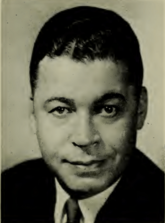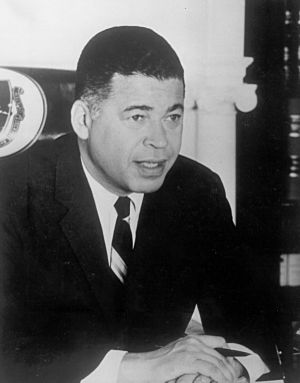Edward Brooke facts for kids
Quick facts for kids
Edward Brooke
|
|
|---|---|
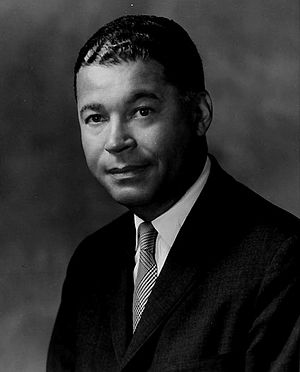
Official portrait, c. 1967
|
|
| United States Senator from Massachusetts |
|
| In office January 3, 1967 – January 3, 1979 |
|
| Preceded by | Leverett Saltonstall |
| Succeeded by | Paul Tsongas |
| 35th Attorney General of Massachusetts | |
| In office January 3, 1963 – January 3, 1967 |
|
| Governor | |
| Preceded by | Edward McCormack |
| Succeeded by | Edward T. Martin |
| Personal details | |
| Born |
Edward William Brooke III
October 26, 1919 Washington, D.C., U.S. |
| Died | January 3, 2015 (aged 95) Coral Gables, Florida, U.S. |
| Resting place | Arlington National Cemetery |
| Political party | Republican |
| Spouses |
|
| Children | 3 |
| Education |
|
| Awards | Presidential Medal of Freedom (2004) Congressional Gold Medal (2008) |
| Military service | |
| Allegiance | |
| Branch/service | |
| Years of service | 1941–1946 |
| Rank | |
| Unit | 366th Infantry Regiment |
| Battles/wars | |
Edward William Brooke III (October 26, 1919 – January 3, 2015) was an American lawyer and politician. A member of the Republican Party, he represented Massachusetts in the United States Senate from 1967 until 1979. Following his election in 1966, he became the first African American elected to the United States Senate by popular vote. Prior to serving in the Senate, he served as the Attorney General of the Commonwealth of Massachusetts from 1963 until 1967.
Born to a middle-class black family, Brooke was raised in Washington, D.C. After attending Howard University, he graduated from Boston University School of Law in 1948 after serving in the U.S. Army during World War II. Beginning in 1950, he became involved in politics, when he ran for a seat in the Massachusetts House of Representatives. After serving as chairman of the Boston Finance Commission, Brooke was elected attorney general in 1962, becoming the first African-American to be elected attorney general of any state.
He served as attorney general for four years, before running for Senate in 1966. In the election, he defeated Democratic Governor Endicott Peabody in a landslide, and was seated on January 3, 1967. In the Senate, Brooke aligned with the liberal faction in the Republican party. He co-wrote the Civil Rights Act of 1968, which prohibited housing discrimination. He was re-elected to a second term in 1972, after defeating attorney John Droney. Brooke became a prominent critic of Republican President Richard Nixon, and was the first Senate Republican to call for Nixon's resignation in light of the Watergate scandal. In 1978, he ran for a third term, but was defeated by Democrat Paul Tsongas. After leaving the Senate, Brooke practiced law in Washington, D.C., and was affiliated with various businesses and nonprofit organizations. Brooke died in 2015, at his home in Coral Gables, Florida, at the age of 95.
Early life and career
Edward William Brooke III was born on October 26, 1919, in Washington, D.C., to a middle-class black family. His father was Edward William Brooke Jr., a lawyer and graduate of Howard University who worked with the Department of Veterans Affairs, and his mother was Helen (née Seldon) Brooke. He was the second of three children. Brooke was raised in a racially segregated environment that was "insulated from the harsh realities of the Deep South", with Brooke rarely interacting with the white community. He attended Dunbar High School—then one of the most prestigious academic high schools for African Americans—and graduated in 1936. After graduating, he enrolled in Howard University, where he first considered studying in medicine, before ending up studying social studies and political science. Brooke graduated from university in 1941, with a bachelor of science degree, and enlisted in the United States Army immediately following the Japanese attack on Pearl Harbor.
In the army, Brooke was commissioned as a second lieutenant, and saw combat in Italy as a member of the segregated 366th Infantry Regiment. Brooke spent 195 days with his unit in Italy. There, his fluent Italian and his light skin enabled him to cross enemy lines to communicate with Italian partisans. By the end of the war, Brooke had attained the rank of captain, a Bronze Star Medal, and a Distinguished Service Award. His time in the army exposed him to the inequality and racism which existed in the army system. This, combined with the signing of Executive Order 9066, led to him rethink his support of Democratic President Franklin D. Roosevelt. His time in the army also changed his perception of race, with him meeting his future-wife Remigia Ferrari-Scacco in Italy. He reasoned that "race had not mattered during our courtship in Italy, and therefore it should not have mattered in the United States". Following his discharge, Brooke graduated from the Boston University School of Law in 1948. "I never studied much at Howard," he later reflected, "but at Boston University, I didn't do much else but study."
Early political career
After graduating from Boston University, Brooke worked as a lawyer. He declined offers to join established law firms, instead opening his own law practice in the Roxbury neighborhood of Boston. Brooke began his foray in politics in 1950, when, at the urging of friends from his former army unit, Brooke ran for a seat in the Massachusetts House of Representatives. Brooke didn't affiliate with both of the major parties, choosing instead to run in both the Democratic and Republican primaries. He won the Republican nomination, and was endorsed by the party, but lost the general election in a landslide to his Democratic opponent. Two years later, he ran again for the same seat, but again lost the election to the same Democratic opponent. In 1960, Brooke ran for secretary of state; he won the Republican nomination, becoming the first black person to be nominated for statewide office in Massachusetts. However, he lost the election to future-mayor of Boston Kevin White, whose campaign issued a bumper sticker saying, "Vote White," a reference to Brooke's race.
Despite losing the secretary's race to White, the closeness of the results led to Republican leaders taking notice of Brooke's potential. Governor John Volpe sought to reward Brooke for his efforts, and offered him a number of jobs, most of them judicial in nature. Seeking a position with a higher political profile, Brooke eventually accepted the position of Finance Commission of Boston, where he investigated financial irregularities and uncovered evidence of corruption in city affairs. He was described in the press as having "the tenacity of a terrier", and it was reported that he "restore[d] to vigorous life an agency which many had thought moribund." He parlayed his achievements into a successful election as Attorney General of Massachusetts in 1962, becoming the first African-American to be elected attorney general of any state.
As attorney general, Brooke gained a reputation as a vigorous prosecutor of organized crime and corruption, securing convictions against a number of members of the administration of governor Foster Furcolo. In 1964, following the nomination of Barry Goldwater as the Republican party's nominee for president, Brooke found Goldwater's nomination offensive. He publicly broke with the party, and implored Republicans "not to invest in the 'pseudo-conservatism' of zealots". His public repudiation of Goldwater actually helped Brooke win re-election in 1964, as he won by a plurality of nearly 800,000. Encouraged by an outpour of positive support, Brooke continued to offer blunt criticisms of the Republicans, though he began softening his rhetoric by proposing strategies to rebuild the Republican party. This included an off-year national convention to "hammer out an agreement for the future of the party" and "draft a responsible platform to address bread-and-butter issues". By 1965, Brooke had emerged as the main Republican spokesman for racial equality, despite "never rallying his race to challenge segregation barriers with the inspirational fervor of a Martin Luther King."
U.S. Senate
First term (1967–1973)
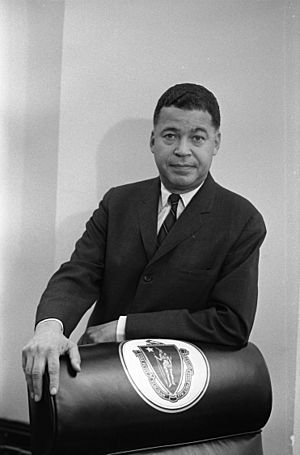
In 1966, Brooke defeated former Governor Endicott Peabody with 1,213,473 votes to Peabody's 744,761, and served as a United States senator for two terms, from January 3, 1967, to January 3, 1979. The black vote had, Time wrote, "no measurable bearing" on the election as less than 3% of the state's population was black, and Peabody also supported civil rights for blacks. Brooke said, "I do not intend to be a national leader of the Negro people", and the magazine said that he "condemned both Stokely Carmichael and Georgia's Lester Maddox" as extremists; his historic election nonetheless gave Brooke "a 50-state constituency", the magazine wrote, "a power base that no other Senator can claim".
Tenure
A member of the moderate-to-liberal Northeastern wing of the Republican Party, Brooke organized the Senate's "Wednesday Club" of progressive Republicans who met for Wednesday lunches and strategy discussions. Brooke, who supported Michigan Governor George W. Romney and New York Governor Nelson Rockefeller's bids for the 1968 GOP presidential nomination against Richard Nixon's, often differed with President Nixon on matters of social policy and civil rights. In 1967, Brooke was awarded the Spingarn Medal from the NAACP.
In 1967, Brooke went to Vietnam on a three-week trip as a fact-finding mission. During his first formal speech in the Senate following the trip, he reversed his previous position on Vietnam War that increased negotiations with the North Vietnamese rather than an escalation of the fighting were needed. He began to favor President Johnson's "patient" approach to Vietnam as he had been convinced that "the enemy is not disposed to participate in any meaningful negotiations".
By his second year in the Senate, Brooke had taken his place as a leading advocate against discrimination in housing and on behalf of affordable housing. With Walter Mondale, a Minnesota Democrat and fellow member of the Senate Banking Committee, he co-authored the 1968 Fair Housing Act, which prohibits discrimination in housing. The Act also created HUD's Office of Fair Housing and Equal Opportunity as the primary enforcer of the law. President Johnson signed the Fair Housing Act into law on April 11, one week after the assassination of Martin Luther King Jr. Dissatisfied with the weakened enforcement provisions that emerged from the legislative process, Brooke repeatedly proposed stronger provisions during his Senate career. In 1969, Congress enacted the "Brooke Amendment" to the federal publicly assisted housing program which limited the tenants' out-of-pocket rent expenditure to 25 percent of their income. Additionally, Brooke voted in favor of the confirmation of Thurgood Marshall to the U.S. Supreme Court.
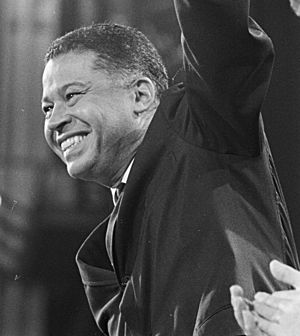
During the Nixon presidency, Brooke opposed repeated Administration attempts to close down the Job Corps and the Office of Economic Opportunity and to weaken the Equal Employment Opportunity Commission—all foundational elements of President Lyndon Johnson's Great Society.
In 1969, Brooke spoke at Wellesley College's commencement against "coercive protest" and was understood by some students as calling protesters "elite ne'er-do-wells" Then student government president Hillary Rodham departed from her planned speech to rebut Brooke's words, affirming the "indispensable task of criticizing and constructive protest," for which she was featured in Life magazine.
On June 9, 1969, Brooke voted in favor of President Nixon's nomination of Warren E. Burger as Chief Justice of the United States following the retirement of Earl Warren. Brooke was a leader of the bipartisan coalition that defeated the Senate confirmation of Clement Haynsworth, President Nixon's nominee to the Supreme Court on November 21, 1969. A few months later, he again organized sufficient Republican support to defeat Nixon's third Supreme Court nominee Harrold Carswell on April 8, 1970. The following month, Nixon nominee Harry Blackmun (who later wrote the Roe v. Wade opinion) was confirmed on May 12, 1970, with Brooke voting in favor. On December 6, 1971, Brooke voted in favor of Nixon's nomination of Lewis F. Powell Jr., while on December 10, Brooke voted against Nixon's nomination of William Rehnquist as Associate Justice. On December 17, 1975, Brooke voted in favor of President Gerald Ford's nomination of John Paul Stevens to the Supreme Court.
Second term (1973–1979)
Relations with the White House and 1972 election
Despite Brooke's disagreements with Nixon, the president reportedly respected the senator's abilities; after Nixon's election he had offered to make Brooke a member of his cabinet, or appoint him as ambassador to the UN. The press discussed Brooke as a possible replacement for Spiro Agnew as Nixon's running mate in the 1972 presidential election. While Nixon retained Agnew, Brooke was re-elected in 1972, defeating Democrat John J. Droney by a vote of 64%–35%.
Tenure
Before the first year of his second term ended, Brooke became the first Republican to call on President Nixon to resign, on November 4, 1973, shortly after the Watergate-related "Saturday night massacre". He repeated the recommendation in a meeting with Nixon at the White House on November 13, 1973. He had risen to become the ranking Republican on the Senate Banking Committee and on two powerful Appropriations subcommittees, Labor, Health and Human Services (HHS) and Foreign Operations. From these positions, Brooke defended and strengthened the programs he supported; for example, he was a leader in enactment of the Equal Credit Opportunity Act, which ensured married women the right to establish credit in their own name.
In 1974, with Indiana senator Birch Bayh, Brooke led the fight to retain Title IX, a 1972 amendment to the Higher Education Act of 1965, which guarantees equal educational opportunity (including athletic participation) to girls and women.
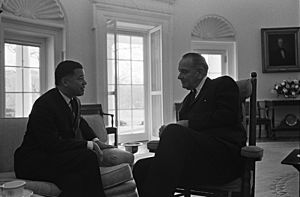
In 1975, with the extension and expansion of the Voting Rights Act at stake, Brooke faced senator John C. Stennis (D-Mississippi) in "extended debate" and won the Senate's support for the extension.
In his 1978 reelection campaign, Brooke lost to Paul Tsongas.
Post-Senate life
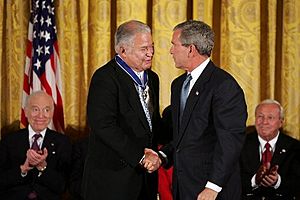
After leaving the Senate, Brooke practiced law in Washington, D.C., first as a partner at the Washington firm of O'Connor & Hannan; later of counsel to Csaplar & Bok in Boston. He also served as chairman of the board of the National Low Income Housing Coalition. In 1984 he was selected as chairman of the Boston Bank of Commerce, and one year later he was named to the board of directors of Grumman.
In 1992, a Brooke assistant stated in a plea agreement as part of an investigation into corruption at the Department of Housing and Urban Development that Brooke had falsely answered questions about whether he or the assistant had tried to improperly influence HUD officials on behalf of housing and real estate developers who had paid large consulting fees to Brooke. The HUD investigation ended with no charges being brought against Brooke.
In 1996, Brooke became the first chairman of the World Policy Council, a think tank of Alpha Phi Alpha, an African-American fraternity. The Council's purpose is to expand the fraternity's involvement in politics, and social and current policy to encompass international concerns. In 2006 Brooke served as the council's chairman emeritus and was honorary chairman at the Centennial Convention of Alpha Phi Alpha held in Washington, D.C.
On June 20, 2000, a newly constructed Boston courthouse was dedicated in his honor. The Edward W. Brooke Courthouse is part of the Massachusetts Trial Court system, and houses the Central Division of the Boston Municipal Court, Boston Juvenile Court, Family Court, and Boston Housing Court, among others. In 2002, scholar Molefi Kete Asante listed Edward Brooke on his list of 100 Greatest African Americans.
In September 2002, he was diagnosed with breast cancer and assumed a national role in raising awareness of the disease among men. On June 23, 2004, President George W. Bush awarded Brooke the Presidential Medal of Freedom. That same year he received the Jeremy Nicholson Negro Achievement Award, acknowledging his outstanding contributions to the African-American community.
During the 2008 presidential election, Brooke indicated in a WBUR-FM interview that he favored Democratic nominee Barack Obama. On October 28, 2009, two days after his 90th birthday, Brooke was presented with the Congressional Gold Medal.
On January 3, 2015, Brooke died at his home in Coral Gables, Florida, at the age of 95. He was buried at Arlington National Cemetery. Brooke was the oldest living U.S. senator until his death in January 2015, and the last living U.S. senator born in the 1910s.
Political positions
Edward Brooke was a self-described moderate or liberal Republican, generally referred to as Rockefeller Republicans. On social issues he was a liberal who supported civil rights, women's rights, and civil liberties such as gay rights. On economic issues he was fiscally conservative, but was pragmatic about it; he still allowed that "There are things that people can't do for themselves and therefore government must do it for them". He was against huge government or bureaucracy.
Awards and honors
- Presidential Medal of Freedom
- Congressional Gold Medal. At his 2009 Congressional Gold Medal Acceptance speech, Brooke scolded policymakers for excessive partisan bickering.
- Bronze Star Medal
See also
 In Spanish: Edward Brooke para niños
In Spanish: Edward Brooke para niños


